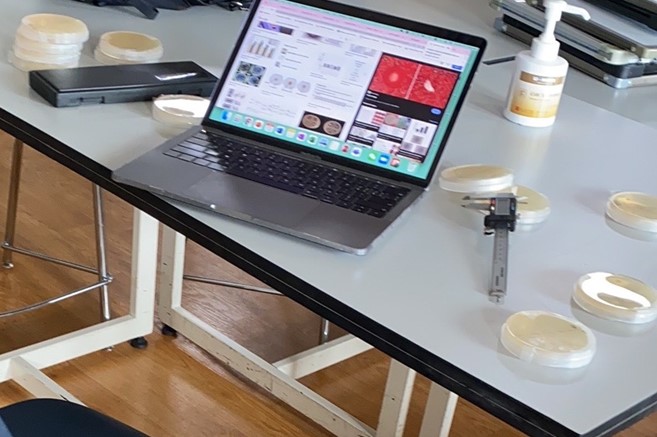Getting Ready for the IB? DCB's IB Perfect Scorer Lily L shares her IB prep tips
The International Baccalaureate Diploma Programme (IBDP) is a globally renowned university entrance programme that is known for its rigorous curriculum, demanding assessments, and preparation for university life.
In our recent piece proudly showcasing our Class of 2023’s IBDP achievements, we also shared how two of our students stood out for their exceptional scores of 45 in the IBDP exams. One of these outstanding achievers was Lily L, an embodiment of dedication and enthusiasm.
 Lily was in the Sustainable Development Goals club. She was also her batch’s Sustainability Prefect
Lily was in the Sustainable Development Goals club. She was also her batch’s Sustainability Prefect
The sight of her scores on the screen felt “unexpected and surreal.” She recalled how, walking out of the exam room, she had thought she had done worse than usual. She couldn’t believe that, despite having such a difficult time with her SL English exam, that she still received a 7. “I felt genuinely rewarded for the hard work and enthusiasm I put into these subjects during the past two years. I also felt grateful to my friends who helped study together with me during the exam season! I don’t think I could have received this score without our last-minute study sessions in the SSC (Student Service Centre) and IBCR (IB Common Room)!”
Goodbye IB, Hello University
It’s goodbye IB, hello university for an excited Lily, who will soon be embarking on her next academic adventure: taking up Chemistry at Imperial College London. She hopes to take advantage of the many opportunities there and make many new connections. “I hope to live a more enjoyable and stress-free life from now and focus more on developing my hobbies, such as working out in the gym or drawing!”
Looking back, she credits DCB for helping her discover her personal interests and find a direction she wants to go towards. And while happy that the IB programme is over, she’s thankful for the experience. She shared how, because of her experiences of writing internal assessments (IA) and the extended essay (EE), she’ll definitely be able to handle the heavy workload at university.
And before she starts on her new journey, we invited her to share some nuggets of wisdom for our younger DCB students about to embark on their own IB journeys.
Lily at DCB
Lily's journey began with her Senior School years at DCB, where she carved out a place for herself within a tapestry of diverse activities. From joining the Symphony Orchestra during Years 7 to 9, to participating in competitions like the World Scholars Cup and National Economics Challenge, Lily embraced opportunities that helped stretch her intellectual boundaries. Her commitment to the Sustainable Development Goals (SDG) Club exemplified her engagement with global issues, as she worked collaboratively to drive change and awareness.
“After 7 years of Senior School education at DCB, I feel like I have gained a useful set of skills that will effectively help me go through the rest of my life. In IGCSE Chinese and IB Spanish Ab initio, I learned how to read, write, and talk using two additional foreign languages. In Key Stage 3 (KS3), PE classes taught me the importance of regular physical exercise, Music classes taught me how to appreciate the music I listen to, and Drama classes taught me how to speak confidently in public. Extracurricular activities and House events enabled me to develop my socialisation, teamwork, and leadership skills. The wide range of subjects that I could choose to study at DCB also helped me expand my horizons and discover a wide range of broad interests. For example, even though I am not going to pursue these subjects in university, I really enjoyed learning Geography in Year 9, History and Psychology in IGCSE, and Economics in IB.”
Important qualities to succeed in the IB programme
When asked about the crucial qualities for success in the IB programme, Lily offered insightful advice that encapsulated her strategic approach.
In Internal Assessment (IA), deciphering and aligning work with examiner rubrics proved pivotal. “When working on internal assessments, including language oral exams, it is crucial to carefully examine and understand the examiner’s rubric and structure your work based on what they expect you to include. If you are confused, you could get some past student samples, print them out and analyse them based on the rubric by annotating the document. It is important to use different revision strategies for different subjects. For skill-based subjects like Mathematics or Spanish, you could focus on application, review past paper questions, and do constant practice. For heavily content-based subjects like Biology and Economics, efficient notetaking is important.”
She also shared how, when she was in Year 12, she made the mistake of copying down every detail from the textbook, realising later that short, concise, and easy-to-understand notes are much more useful. For students who find TOK (Theory of Knowledge) difficult, she recommends reading the TOK textbooks as they contain various interesting philosophical ideas that can be helpful to further enhance one’s understanding and perspective.
Don’t overthink; Just do it
Navigating the intricate web of time management proved to be a formidable challenge for Lily during her IB journey. “I think I was quite terrible at time management during the IB programme. There were also countless times when I couldn’t sleep because I had only started revising for an important exam the night before. Reflecting back, I really regret behaving in such an unorganised way. I want to tell current IB students to avoid overthinking assignments and to just immediately start doing what they need to do whenever they have time!
Regarding extracurricular activities, in Year 12 I used to lead and participate in a large number of ECAs, but personally, they didn’t feel like a burden. I recommend doing a lot of extracurricular activities in Year 12 because there is not enough time to focus on them in Year 13.”
To IB Students: Protect your mental health!
She also echoed the sentiments of many fellow IB students: protect your mental health. “I want to strongly emphasise the importance of protecting the mental health and well-being of IB students. I realised that there is a huge jump in the amount of workload from Year 12 to Year 13, and I think many students, including myself, found it mentally difficult to transition.
At the beginning of Year 13, I remember there were some moments when it felt extremely difficult to handle my level of stress, mainly with all the university application deadlines and coursework deadlines suddenly rushing in! I would like to especially thank our Head of Year Ms Kerr for providing every single student of our year group with so much unconditional love and care from the start of the IB programme until the very end! I would not have been able to persevere until the end without her kind words of advice!”
 Lily working on her Biology EE
Lily working on her Biology EE
Lily also adds how supportive her teachers were during her IB life, especially when she was struggling to complete important pieces of her coursework such as IA, EE and TOK. “It was very helpful how I could ask questions regarding class content anytime, during class time or even outside of lessons, and anywhere – in school or online. My teachers were very passionate and enthusiastic, always looking for ways to improve our learning experience and make our lessons as fun as possible such as through project work or interactive activities.
Lily’s journey encapsulates the power of dedication, the significance of mentorship, and the transformational potential of a holistic education. As Lily embarks on new adventures, her story remains a testament to the extraordinary heights achievable through hard work, passion, and unwavering support. Now a DCB alumna and one of our latest additions to our International Old Alleynian (IOA) community, we’d like to congratulate Lily once again and we hope you achieve all your goals in university and beyond!








